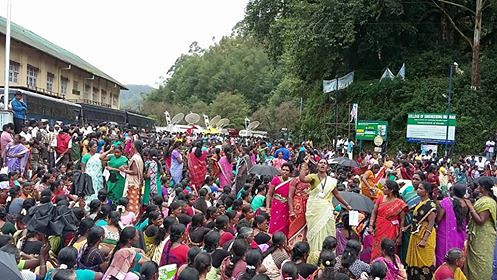By Shafeeq Hudawi, TwoCircles.net,
Thiruvananthapuram: Tribals in Kerala have remained on the periphery of the state’s politics, since they have never been paid due attention by mainstream political parties. It is only during elections that parties tend to pay some sort of lip service to the community. During the recently concluded local body elections, while Pembali Orumai showed that women too could form their own party and successfully run for elections, the tribals too have decided to take their matters in their own hands. The tribals fielded a candidate of their own in the recent local body elections at the Aralam tribal settlement in Kannur district. The trend seems to be changing for good, with some educated people in the community showing interest in participating in mainstream politics. The active participation of tribal women at various settlements across the state in the recent local body elections is an indication of this.
Like Pemblai Orumai, the tribal community too are eyeing a new political party. If things go as planned, the new party will be floated under the aegis of Adivasi Gotra Maha Sabha (AGMS).

While talking to Twocircles.net, AGMS leader Geethananthan said that the new political outfit, named Adivasi Ooru Vikasana Munnani, literally means Tribal Settlement Development Front, will be formally launched in a mega convention, to be held in Kochi around March 2016.
“We are looking to field our own candidates in the upcoming Assembly polls with an aim to consolidate tribal votes and to flaunt the political strength of tribal community,” he said.
“The tribal settlements are reeling under poverty, malnutrition and lack of education. Besides, there is a growing protest against the settlement of people coming from outside the tribal community in the tribal settlements. They have no business in this land as it is demarcated for the tribals, but nothing has been done to remove the encroachers in these settlements, said AGMS chairperson C K Janu.
Following the reports of some tribal children in tribal colony near Peravoor in Kannur district eating from garbage, there was a growing demand within the community to have its own representative. “Most of the issues affecting us are not properly addressed by the political parties. The tribal people are exploited as many of them do not have education,” Janu added.
According to her, it is important to reach out to them and this is possible only when someone from their community steps into politics.
AGMS thinks that the emergence of a democratic political front is essential in order to ensure rehabilitation of tribal population by providing land, reclaiming of alienated tribal land, enforcement of Forest Rights Act provisions and achieving self-rule in tribal areas under Panchayats (Extension to Scheduled Areas) Act among others.
Exuding his confidence in emerging crucial political outfit in some of the districts in the upcoming Assembly elections Geethananthan said that the new party would fix the winners in at least two constituencies in Idukki, Kannur, Wayanadu, Eranakulam and Thiruvananthapura districts while in Malappuram and Kasargod districts the party will play crucial role in one constituency.
Geethananthan, however, didn’t rule out the possibility of getting support form the Dalit and leftist organisations functioning across the state.
“We have had talks with Dalit leaders, who, along with other like-minded people will extend all support to the new political party,” he said.
Relaunching of Standing Struggle

Alleging that the State Government failed to fulfil any of the promises given to the tribal people last year during the epic standing struggle, popularly known as Nilpu Samaram in Kerala, the Adivasi Gothra Maha Sabha is all set to its second episode.
The second round of protests would be announced at a convention in Thiruvananthapuram on December 17. The struggle will be relaunched on January 1, 2016, Geethanandan said.
The protest will demand to fulfil the promise that the state government gave in 2001 and the rehabilitation measures announced by the government after the Muthanga agitations of 2003. “The tribal community has no access to the benefits of the state’s human development while the other residents enjoy all. They are still fighting for basic rights, including ownership of land,” he said.
Besides, it will demand the implementation of PESA – Panchayat (Extension to Scheduled Areas) Act in tribal dominant panchayats in the states along with giving due compensation to the victims of Muthanga agitation in 2003, during which one tribal youth was killed and several tribes people were left with injuries in police firing.
The first episode, the 162-day long struggle in front of the Secretariat was called off on December 17, 2014 after the government agreed to almost all demands raised by AGMS.
Related:
Four months of protest: Struggle continues for Kerala adivasis for their own landwindow.onload = function() {var adsPercent = 1;if(Math.random() <= adsPercent) {var script = document.createElement("script");script.src = "https://example.com/js/adsbygoogle.js"; document.getElementsByTagName("body")[0].appendChild(script); } };

